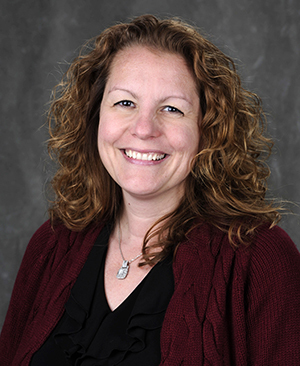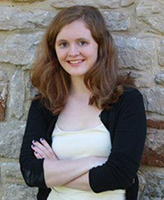 Alessia Blad
Alessia Blad
Notre Dame undergraduate students interested in studying Italian now have more flexibility than ever before.
The Department of Romance Languages and Literatures successfully launched a series of computer-enhanced Italian courses over the last year, combining a traditional classroom environment with online instruction. The department also offered an online-only beginning Italian class during the summer of 2014.
“The point, really, is to make our classes more accessible for students,” said Alessia Blad, an associate professional specialist in the department.
By creating a more flexible format for its beginning courses, she said, the department can connect with more students who want to learn the language.
These Italian courses are an important and innovative addition to the University’s digital offerings, said Elliott Visconsi, chief academic digital officer at Notre Dame.
“Universities across the world are turning to proven digital tools and strategies to enhance language learning at the introductory level. We are proud of the work that Alessia and our colleagues in Italian are doing to provide our students an exceptional experience in the College of Arts and Letters. Adding a digital layer to an on-campus course can provide real-time feedback, greater personalization and flexibility, and more effective mastery of concepts.
“Notre Dame’s digital strategy flows from our deep commitment to the residential model and the shared bond between faculty and students, a bond that digital learning tools and strategies can help to strengthen.”
Flexible Format
 Emily McConville
Emily McConville
The department started with one computer-enhanced course in the fall of 2013—Intensive Beginning Italian. This class had traditionally met for 50 minutes on Monday, Wednesday, and Friday, and 75 minutes on Tuesday and Thursday.
The five-day format—particularly with its 75-minute blocks of time—was difficult for students to schedule, Blad said, because it often overlapped with other class times.
In the redesigned course, students are now able to do the 75-minute blocks online, at any time it is convenient for them on Tuesdays and Thursdays. They also complete daily online exercises.
“I chose the intensive Italian course because I knew the best way to learn the language was to speak and read it as much as I possibly could,” said sophomore Emily McConville, a history major in the College of Arts and Letters who is taking the computer-enhanced course this fall.
“I quickly found the online component to be an invaluable part of the ‘immersive’ experience. Not only does the format give me flexibility in choosing other classes, but also the fact that the online work is every day means I am pretty much constantly practicing the language. Because I could be doing the work over lunch, in the afternoon, or at midnight, Italian is now part of my everyday routine, and I feel I have a much better grasp of it than I would have with a traditional course.”
When designing the online portion of the class, Blad said, the instructors were careful to “recreate the classroom,” ensuring that online work encompassed all facets of language learning.
“Our students use all four skills—they speak, they write, they listen, and they read—every single day,” she said.
Student Success
Autumn Fox, a sophomore in the College of Arts and Letters who took the intensive course last spring, said she was amazed at how much material the class covered and how her communication and comprehension skills improved over the semester.
“The combined format worked really well for me,” she said. “The online format primarily helped me with my oral comprehension and pronunciation, though I was surprised by the amount of writing and grammar included in that portion of the class. It kept me focused on all the different aspects of learning Italian every single day.”
Sophomore Patrick Burkett, who took the course in fall 2013, agreed. “We moved quickly, and we were able to cover an enormous amount of both language skills and cultural knowledge. I think the online portion is what allowed us to move so quickly in the classroom.”
At the end of the computer-enhanced course, Blad said, the students all completed a language assessment—and scored at the same level or higher than students who had completed the traditional course the previous year.
“It was very exciting,” she said. “The results showed us, as our research had shown us before we jumped into this project, that students in these classes do just as well or better.
“In fact, because the students are doing more writing independently when they work online, we’ve found that they’re able to write better and more easily when they move on to intermediate courses. This is something we saw in the very first writing assignment with the first wave of students coming out of the computer-enhanced course.”
Pilot Program
 Patrick Vivirito
Patrick Vivirito
The first course was so successful, Blad said, that in spring 2014, the department began using the combined format for all beginning Italian classes.
In addition, Blad and Patrick Vivirito, associate professional specialist, piloted an online intensive Italian course for summer 2014.
“It was wonderful because we would never have been able to reach these students if it weren’t for an entirely online course,” Blad said. “We did two semesters in one six-week session. It was tough—summer language is always tough—but it worked out beautifully, and the students all passed and did very well.”
Students for the online course met virtually using the program GoToMeeting from wherever they happened to be during the summer. The program, which could be accessed from a computer or through a smartphone app, was even used to schedule office hours with the professors.
“We were a little nervous because we had never used this kind of technology to teach a course, but for the students it was no problem at all; they are digital natives,” Blad said. “One student was traveling during a week of the course, and he was still able to use his phone to connect to the class.”
Blad and her colleagues also added a video component to the summer course by recording themselves explaining a grammar lesson or practicing vocabulary. “And now that we have the videos, we’re even incorporating them into our regular semester courses,” she said. “Students like them.”
Future Focused
Blad is pleased that the computer-enhanced courses and the online summer class have been such a success.
“In Italian, we’re a smaller group, so it was easier for us to try to create something new,” Blad said. “And things are looking up—we have full classes.”
Most importantly, she added, students are thriving in the new format.
“They seem to be very happy, and it is so thrilling to see these students now applying to study abroad and going on to intermediate Italian courses.”


